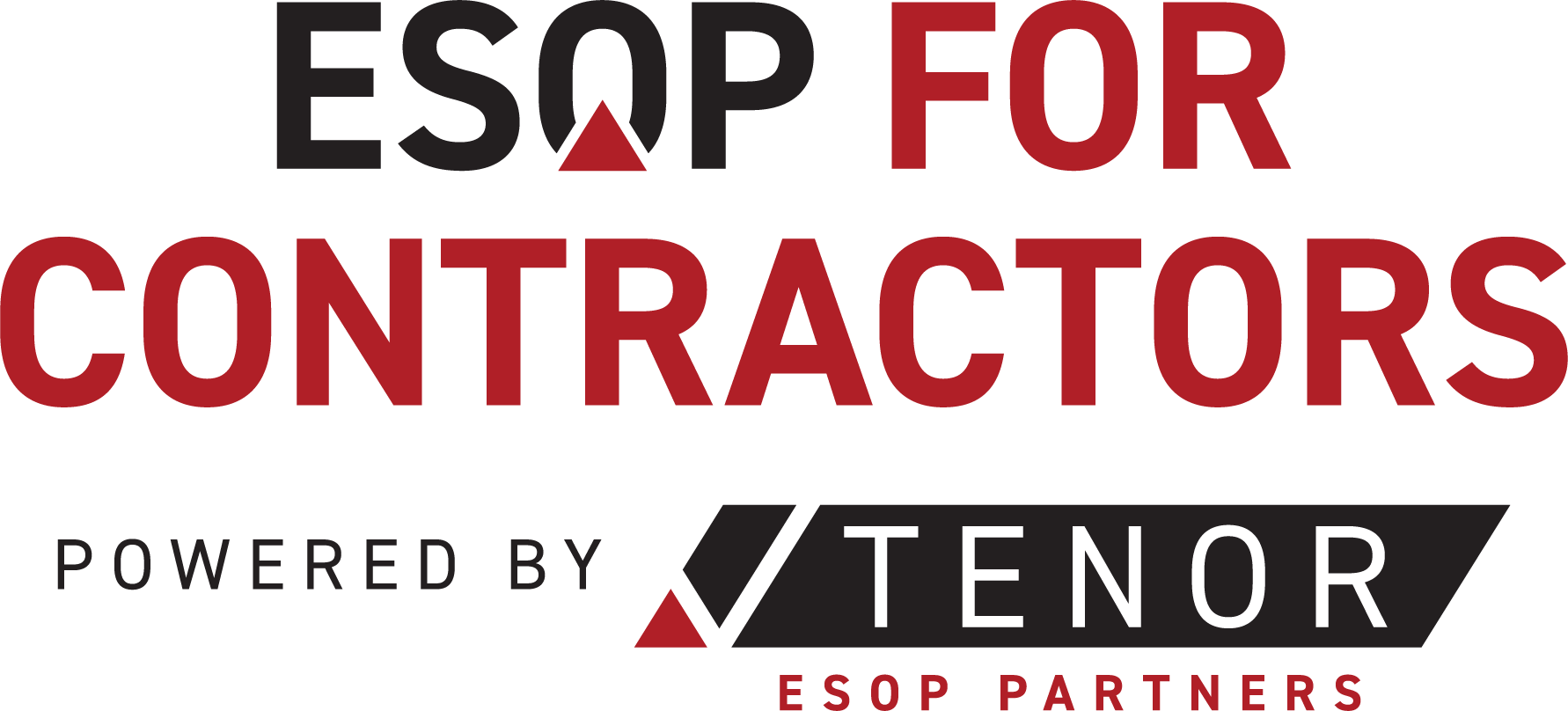Time to read: 8 minutes
Valuing Your Contracting Company for Transition
Beyond the Balance Sheet: True Value Drivers in Contracting
When it comes time to transition your contracting business, understanding its true value becomes essential. Unlike many industries where standard multiples and formulas apply, contracting businesses require specialized valuation approaches that account for their unique characteristics. Your equipment fleet may be worth millions, but your company's true value extends far beyond tangible assets.
Contracting business valuations must account for project cycles, backlog quality, workforce capabilities, and bonding capacity. This guide explores the key factors that influence contractor valuations and identifies practical steps you can take to enhance your company's value before transition.
Traditional Valuation Methods in Contracting
While specialized approaches are necessary, most contractor valuations begin with traditional methodologies:
Asset-Based Valuations
Asset-based approaches inventory your company's tangible assets, including equipment, real estate, and working capital. These approaches establish a baseline value but typically undervalue well-established contracting businesses by ignoring intangible assets. Asset-based methods prove most relevant for:
- Equipment-intensive civil contractors where physical assets represent significant value
- Underperforming businesses where liquidation value may exceed operational value
- Early-stage contractors without established performance history or significant backlog
Income-Based Valuations
Income approaches value your business based on its earning capacity, typically using adjusted EBITDA (Earnings Before Interest, Taxes, Depreciation, and Amortization) multiplied by an industry-specific factor. For contracting businesses, these multiples typically range from:
- 3-4x adjusted EBITDA for residential and light commercial contractors
- 3.5-5x adjusted EBITDA for established commercial contractors with strong backlog
- 4-6x adjusted EBITDA for specialty contractors with unique capabilities and stable client bases
Market-Based Valuations
Market approaches compare your business to similar contracting companies that have recently sold. While conceptually straightforward, finding truly comparable transactions proves challenging given the unique aspects of each contracting business. These approaches work best when abundant market data exists for similar contractors in your region and specialty.
Contractor-Specific Value Drivers
Beyond traditional valuation methods, several factors uniquely impact contracting business valuations:
Backlog Quality and Consistency
Your project backlog represents contracted future revenue, but all backlog is not created equal. Valuation professionals assess backlog based on:
- Client quality and payment history
- Project type and historical profit margins on similar work
- Stage of completion and potential for margin erosion
- Seasonality and logistical sequencing
High-quality backlog with reliable clients and proven profit potential significantly enhances valuation multiples. Commercial contractors with stable, negotiated work typically command higher valuations than those dependent on hard-bid public projects.
Bonding Capacity and Surety Relationships
For many contractors, bonding capacity directly impacts growth potential and projects you can pursue. Valuation experts evaluate:
- Current bonding program and capacity utilization
- Surety relationships and history
- Transferability of bonding capacity during ownership transition
- Claims history and surety underwriting conditions
Strong, transferable bonding programs enhance business value by ensuring the company can continue pursuing appropriate projects during and after transition. This factor proves particularly critical for contractors performing public work or large commercial projects.
Workforce Capabilities and Stability
In contracting, your people represent your operational capacity and institutional knowledge. Valuations consider:
- Management team depth beyond the owner
- Key employee retention history and incentives
- Specialized certifications and licenses
- Field supervision quality and experience
Businesses with strong leadership teams independent from the owner typically command significantly higher valuations. Specialty trades with certified technicians and residential builders with proven project management teams benefit particularly from this value driver.
Estimating Accuracy and Project Management Systems
Your ability to consistently bid and deliver profitable projects directly impacts valuation. Buyers and appraisers examine:
- Historical estimating accuracy compared to actual results
- Project management systems and controls
- Change order management and documentation
- Project closeout effectiveness and timeline
Documented systems that produce consistent results substantially increase business value by demonstrating transferable processes rather than owner-dependent capabilities. Commercial contractors with strong preconstruction services and civil contractors with sophisticated equipment management systems benefit significantly from this factor.
Industry-Specific Valuation Considerations
Different contracting sectors face unique valuation factors:
Commercial Construction
Commercial contractors are typically valued based on:
- Quality and diversity of client relationships
- Preconstruction capabilities and design-assist experience
- Subcontractor relationships and management systems
- Negotiated versus hard-bid work ratio
- Project management infrastructure and reporting systems
Value enhancement opportunities include developing client relationship management systems, strengthening preconstruction services, and balancing portfolio risk across project types and delivery methods.
Specialty Trades
Specialty contractors command premium valuations based on:
- Technical capabilities and specialized certifications
- Service contract revenue stability
- Proprietary installation methods or systems
- Customer diversification across market sectors
- Licensing in high-barrier jurisdictions
To increase value, focus on developing recurring service relationships, documenting proprietary methods, and ensuring technical capabilities extend beyond key individuals to the broader organization.
Heavy Civil/Infrastructure
Civil contractors are valued considering:
- Equipment fleet condition and management systems
- Project performance history on public works
- Estimating accuracy for unit price contracts
- Material production capabilities (aggregate, asphalt, concrete)
- Geographic market coverage and mobilization capabilities
Value enhancement strategies include implementing comprehensive equipment management programs, strengthening public agency relationships, and developing material supply advantages in key markets.
Residential Building
Residential builders' valuations emphasize:
- Land positions and development pipeline
- Product design and intellectual property
- Customer satisfaction metrics and warranty history
- Sales and marketing effectiveness
- Trade contractor relationships and management
To maximize value, focus on building systems that reduce custom decision-making, developing repeatable floor plans and specifications, and creating customer relationship management processes that don't depend on the owner.
Financial Adjustments in Contractor Valuations
Accurate contractor valuations require several standard financial adjustments:
Owner Compensation Normalization
Most contractor valuations normalize owner compensation to market rates for the services provided. This adjustment accounts for owners who take above-market compensation or, conversely, undercompensate themselves to enhance profitability. This normalization ensures the business value accurately reflects sustainable earnings.
Equipment Fleet Adjustments
Equipment-intensive contractors require adjustments for:
- Over or under-depreciated equipment
- Leased versus owned equipment implications
- Upcoming major replacement requirements
- Maintenance program effectiveness
These adjustments ensure the valuation accurately reflects the true economic condition of the fleet rather than accounting treatments.
Work-in-Progress Accounting
Contractors using percentage-of-completion accounting require careful WIP schedule analysis to identify:
- Potential profit fade on active projects
- Claim and change order recovery likelihood
- Underbilling and overbilling positions
- Revenue recognition practices versus industry standards
Proper WIP adjustments ensure the valuation reflects genuine economic performance rather than accounting timing differences.
Value Enhancement Strategies Before Transition
Regardless of your transition timeline, several strategies can enhance your contracting business's value:
System Documentation and Implementation
Document operational processes that currently exist only in key people's heads. Implement software systems that standardize estimating, project management, and financial reporting. Create training programs that transfer knowledge systematically rather than through apprenticeship alone.
Management Team Development
Develop leadership capabilities beyond yourself by delegating meaningful responsibility and authority. Document successful project execution by your management team without your direct involvement. Implement formal management training programs focused on your company's specific operational needs.
Client Relationship Institutionalization
Transform personal client relationships into company relationships through systematic contact management, formal communication protocols, and progressive introduction of multiple team members to key clients. Document client history, preferences, and relationship development efforts.
Financial Performance Stabilization
Focus on consistent financial performance rather than dramatic peaks and valleys. Implement project selection criteria that emphasize margin reliability over volume. Develop balanced portfolios across project types, sizes, and geographies to reduce concentration risk.
Taking the Next Step
Understanding your contracting business's true value requires specialized expertise and industry-specific insight. Whether you're planning an imminent transition or simply preparing for the future, professional valuation services tailored to your contracting sector provide invaluable guidance.
For a confidential, no-obligation consultation about your contracting business's value and transition readiness, contact our specialized team of contractor transition advisors. We'll help you understand where your business stands today and identify specific opportunities to enhance its value before transition.
Developing a clear understanding of your company's value drivers provides the foundation for all successful contractor transitions. By taking proactive steps now, you position your business for maximum value when you eventually decide to transition—whether through family succession, management buyout, employee ownership implementation, or strategic sale.
Start your valuation journey today to ensure the business you've built delivers the transition outcomes you deserve.
How to get started
Getting started with an Employee Stock Ownership Plan (ESOP) can transform your contracting business, unlocking potential for growth and ensuring lasting value for everyone involved. At ESOP for Contractors, we understand the intricacies of the process, from assessing your company's current status to designing a tailored ESOP that aligns with your goals.
Our leadership team knows firsthand how to create winning strategies that benefit both owners and team members alike. If you're curious about how an ESOP could enhance your business's future, we invite you to reach out for a free consultation. Let’s explore how we can help you achieve sustainable success together!

Gary Gray, Founder
Book a Free Consultation
Interested in a free consultation for your contracting business? Send us a message - We’re here to help.
Thank you for contacting us! We’ve received your message and will get back to you as soon as possible. If you need immediate assistance please call us at 404-849-0244.
Please try again later















